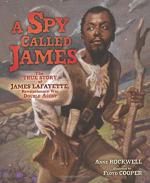- Books
- Connect Your Summer
- May We Suggest
- American Revolution
- historical fiction
- Narrative Nonfiction
- History
- History
July 2, 2017 | strande
The Fourth of July holiday serves as an inspiration to look back at the beginning of the United States. The following materials might interest readers who enjoy the early history of our country, or who like learning new and surprising things. Click on the titles for location and availability.
Shares the stories of remarkable women who shaped American history between 1796 and 1828, including Dolley Madison, Isabella Graham, and Sacajawea.
The true story of James Armistead Lafayette--a slave who spied for George Washington's army during the American Revolution. But while America celebrated its newfound freedom, James returned to slavery. His service hadn't qualified him for the release he'd been hoping for. For James the fight wasn't over; he'd helped his country gain its freedom, now it was time to win his own.
Unable to enlist in the army due to a childhood injury, Noah Daniels watches the Revolution from his farm in New York until a raid on his settlement thrusts him into one of the bloodiest battles of the American Revolution, and ultimately, face to face with the enemy.
Collects comic adaptations of true stories from New England colonial life between 1750 and 1775, from gravedigging medical students, counterfeiters, and female playwrights.
Introduces Suzy Wright, a Quaker who helped settle the Pennsylvania frontier, defended the rights of Native Americans, and provided legal counsel to her neighbors.
1793, Philadelphia. The nation's capital and the largest city in North America is devastated by an apparently incurable disease, cause unknown. The search for the fever's causes and cure, not found for more than a century afterward, provides a suspenseful counterpoint to this riveting true story of a city under siege. Drawing on first-hand accounts, Murphy spotlights the heroic role of Philadelphia's free blacks in combating the disease, and the Constitutional crisis that President Washington faced when he was forced to leave the city--and all his papers--while escaping the deadly contagion.
A portrait of the influential intellectual behind such books as "The Age of Reason" discusses his limited formal education, fervent support of American independence, and life-risking advocacy of history-shaping ideas.
After being sold to a cruel couple in New York City, a slave named Isabel spies for the rebels during the Revolutionary War.
A biography of America's first traitor--Benedict Arnold--that reads like an adventure tale, full of heroism, treachery, battle scenes, and surprising twists.
When the Marquis de Lafayette ran off to join the American Revolution against the explicit orders of the king of France, he was a strong-willed nineteen-year-old who had never set foot on a battlefield. Although the U.S. Congress granted him an honorary commission only out of respect for his title and wealth, Lafayette quickly earned the respect of his fellow officers with his bravery, devotion to the cause of liberty, and incredible drive.
Biographical sketches chronicle the contributions of enslaved and free blacks during the Revolutionary War, including Prince Hall, who organized the first branch of black Freemasons, and Richard Allen, who founded the African Methodist Episcopal Church.
Songs, oral histories, maps, and more than eighty archival illustrations help trace the history of sugar and the sugar trade. One stop in this history: how sugar helped fuel the fight for freedom in the late eighteeth century.
An examination of American slavery through the true stories of five enslaved people who were considered the property of some of our best-known presidents.
This is both the story of how the world's first submarine was built and how it was employed in the Continental Army's desperate attempt to hold on to New York in 1776.














